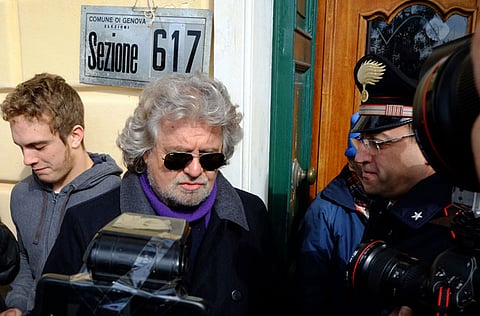Clowning glory of Italian politics
This election shows why Italians are instinctively anarchic

There is an old saying that in most countries the political situation is serious, but not desperate; whereas in Italy it’s desperate, but not serious. Now that a comedian, Beppe Grillo, has won more votes than any other politician, the saying is more apt than ever.
The country is in crisis and a joker is the only person who can stop it becoming a laughing stock. Italy has always been, politically, a bit of a basket case. The country has been the cradle of more political innovations than any other: from the Signoria (with the Medici and Visconti) to Futurism (Marinetti), Fascism (Mussolini), Euro-Communism (Togliatti) and media mogulism (Berlusconi). Italians have always been, for better or worse, political innovators.
In a way, it’s no surprise that the country has now invented Bloggerism, giving more than 25 per cent of its votes to a blogging satirist. The extraordinary innovation of last week’s election was that it turned political logic on its head.
In a country where Silvio Berlusconi has a massive media arsenal at his disposal, it’s always been assumed that to win an election you need to go on television as much as he does. But Grillo refused to do so, preferring instead to tour the peninsula in a camper van, swim the Straits of Messina, and use the internet as an electronic balcony.
If people are now talking about the “Italian Spring”, it’s because Citizen Kane appears to have been usurped by a witty nerd who looks like Snow White’s chipper friend. The result would have been inconceivable without the Italian economy being stagnant for a decade. By next year, the country’s economy will have contracted by a tenth from its peak. Youth unemployment is at a staggering 37 per cent.
For two decades foreigners have been wondering what on earth they saw in Berlusconi. The answer is that they like a charismatic, red-blooded kind of guy. Against a backdrop of verbose, patrician MPs, Berlusconi seemed like a man of the people. Though politically his opposite, Grillo has the same appeal: he gets angry, he swears, he jokes.
The way he harangues the piazza, and whips the crowd up into a kind of enraged hysteria, is not so different to one of his less savoury predecessors. In many ways, though, he is the inheritor of a strange political movement which began in 1944 called Qualunquismo: it aimed to do away completely with political parties by appealing to the ordinary man, the uomo qualunque. Given the ubiquity of organised crime and corruption, there appears, in every generation, a ground-level qualunquismo that promises to sweep away the political “crooks”.
Grillo has relentlessly campaigned for a “clean parliament”, purged of those with criminal records. The irony is that, having a manslaughter conviction for killing three passengers in a car in 1981, Grillo has said that he himself won’t take up a seat in parliament. Usually, what happens to the qualunquismo movements is that the new broom gets stuck in the marmellatona — the “massive jam” — of Italian politics, and the broom gets dirty rather than parliament clean. It’s hard to remember, but Berlusconi and Umberto Bossi, the disgraced former leader of the Northern League, were supposed to do away with the “thieves” in Rome.
In Italy the state is portrayed as the problem and, consequently, the country has precious few statesmen (“a statesman,” said Alicide De Gaspari, one of the Republic’s founding fathers, “thinks not about the next election, but about the next generation”).
The election also reflects the fact that the Italians are instinctively anarchic. The fact that Grillo claims not to be a leader at all, but merely a facilitator, endears him to the idealistic outlaws in his ranks. That anarchism was especially apparent with regard to Europe. The more German politicians and European bureaucrats urged Italians to swallow the medicine of austerity offered by Mario Monti — nicknamed “Rigor Montis” by Grillo — the more Italians became determined to resist foreign interference.
The reason 55 per cent of Italians voted for either Grillo or Berlusconi, dubbed the two “clowns” by last week’s Economist, was that they don’t like being told what to do by Berlin or Brussels. There is, as they say, history here. The last time Italy had a technocratic government, under Carlo Azeglio Ciampi in the early 1990s, acute austerity was introduced to squeeze it inside the economic requirements for joining the single currency. That austerity was sold with the line that, once inside, it would all be milk and honey. There has been an economic slump ever since. And now, for the last year, Italians have once again endured austerity introduced by an unelected technocrat who they perceive is controlled from abroad.
So there is now a tangible feeling that Italy, more than Greece, represents a threat to the stability and unity of the European Union.
What is certain is that there’s a power vacuum in Italy. Not only is there no Pope, there’s no government and the current head of state, Giorgio Napolitano, steps down next month. The great screen writer Ennio Flaiano once quipped: “Italy is the country where the shortest line between two points is an arabesque”. Before Italy gets some new leaders, there’s a lot of dancing to be done.
— The Telegraph Group Limited, London, 2013
Tobias Jones’s book about the Italian deep south, Blood on the Altar, has just been published by Faber in paperback.
Sign up for the Daily Briefing
Get the latest news and updates straight to your inbox



